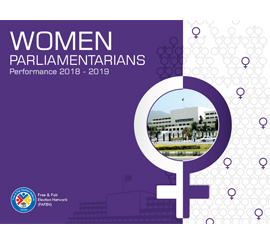ISLAMABAD, March 8, 2019: Women parliamentarians maintained a track record of consistently surpassing reasonable performance expectations during the year 2018-2019 by making remarkable contributions to setting the agenda for parliamentary business, and sustaining spirited deliberations on a range of pressing matters. This has been observed in a report released by Free and Fair Election Network (FAFEN) on the occasion of International Women’s Day.
Female lawmakers constitute one fifth (20 percent or 89) of the Parliament – 69 in the National Assembly and 20 in the Senate. They sponsored 53 percent (39 out of 74) private members’ bills, 27 percent (27 out of 100) resolutions, 47 percent (51 out of 108) Calling Attention Notices, and 32 percent (561 out of 1772) questions in both Houses of the Parliament. Moreover, they also initiated 40 percent (four out of 10) proposals for amendments to the parliamentary rules of procedure and 39 percent (41 out of 104) motions for debate on issues of public importance. They initiated around 30 percent of the parliamentary interventions singly or in partnership with other women while also partnered an additional three percent business with their male colleagues.
On an average, each female lawmaker in the National Assembly sponsored eight agenda items in comparison to three items by each male lawmaker. However, in the Senate, they sponsored seven agenda items as compared to eight items by their male colleagues. Besides agenda contribution, female lawmakers also actively participated in the debates on scheduled business and in raising Points of Order and Matters of Public Importance. Around 62 percent female lawmakers – 46 percent of female MNAs and 90 percent of female Senators – contributed to the discussions and debates during the parliamentary proceedings.
An analysis of the official attendance records of the National Assembly and the Senate illustrates that female lawmakers are more regular in attendance than their male colleagues. On an average, each female Member of the National Assembly (MNA) attended 83 percent of the Lower House sittings while each Senator attended 64 percent of the Senate sittings. The male MNAs and male Senators attended 70 percent and 57 percent sittings of their respective House. Similarly, each NA sitting witnessed around 70 percent of the female MNAs in attendance as compared to 60 percent male MNAs. In the Upper House, each sitting had 83 percent female senators and 71 percent male senators present in the House.
However, despite female lawmakers’ remarkable contributions to agenda, their business suffered from neglect in the Lower House. The analysis of the legislative records suggests the bills initiated by female lawmakers were less likely to be taken up in the House as compared to those sponsored by male lawmakers as only a quarter (five out of 19) of the female-sponsored bills passed the first reading stage in comparison to 58 percent (seven out of 12) male sponsored bills. Similar was the case with the female-sponsored resolutions. Only two (12 percent) of 16 female-sponsored resolutions were adopted as compared to 13 (45 percent) male-sponsored resolutions. Female-sponsored agenda may also have lower chances of being addressed because of the fact that it mostly originates as private members’ business unlike the male-sponsored agenda, a considerable portion of which comes from the government due to the male-dominated federal cabinet.
In comparison with last parliamentary year (2017-18), the contribution of the female lawmakers to the agenda in 2018-2019 witnessed a decline from 39 percent to 33 percent. However, the attendance of female MNAs has increased since last year while the attendance of female Senators remained unchanged. The average attendance of each female MNA was 67 percent during 2017-18 and 83 percent during 2018-19.
This performance analysis report covers the eight sessions of the 15th National Assembly held between August 2018 and February 2019 and 13 sessions of the Senate held between March 2018 and February 2019.
To download Urdu Press Release, click here | To download complete report, click here


